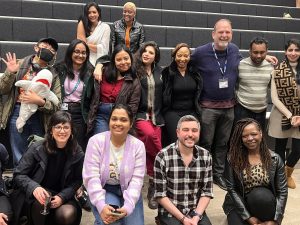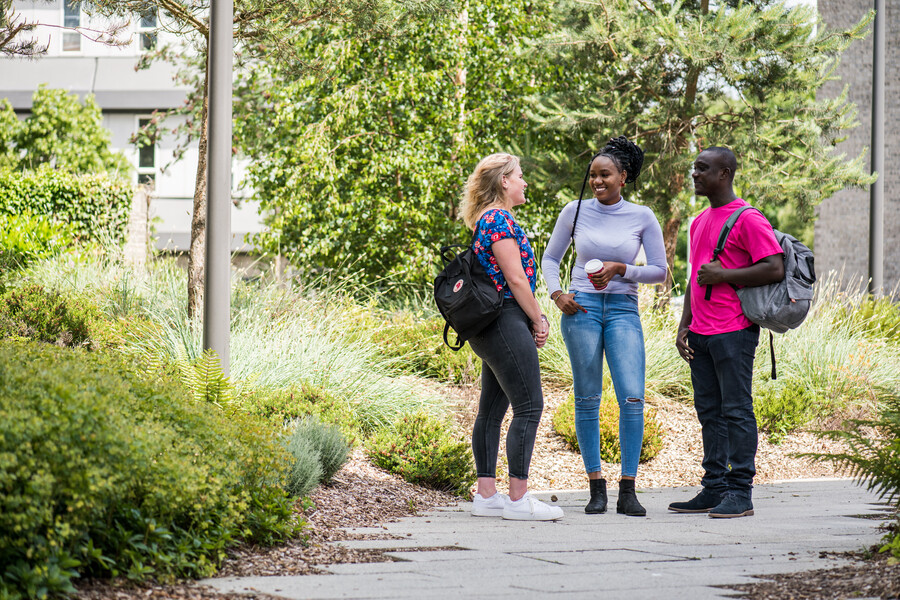 Produced by Guest blogger
Produced by Guest blogger
This is a guest blog written by Suchismita Ghosh, an MA Creative Writing and Publishing student, on her experiences of the Rising Voices showcase for BIPoC (Black Indigenous People of Colour) writers held here at Bournemouth University.
The Rising Voices launch event on 28 April 2023 was a collaboration between Bournemouth University and Arts University Bournemouth, aiming to create visibility for Black, Indigenous, and People of Colour (BIPoC) writers in the Dorset area. The initiative is led by Dr. Aanka Batta, a migrant from South Asia, a poet, diversity and racial justice consultant, and educator, who serves as the director of the programme.
The launch event was open to all and offered attendees free drinks and snacks. Dr. Batta and Dr. Brad Gyori, the principal investigator, designed the launch event to challenge barriers and develop the programme for BIPoC writers. The programme includes the launch event, which was an open lecture on Decoloniality in the arts and education, along with a series of four workshops for writers and a showcase finale at The Palace Court Theatre on 15 June 2023. As a person of colour and migrant myself, attending the Rising Voices event was a truly inspiring experience. It was refreshing to see an initiative that was specifically geared towards creating visibility for BIPoC writers in the Dorset area.

The Rising Voices programme is a significant step towards challenging the colonial ways of doing art in the Dorset area and an opportunity for writers of colour to develop their skills and showcase their work. It is also the only PoC-led writer’s development programme for writers of colour in Dorset, and the only one looking at decoloniality in the arts and education. This is a crucial aspect of the initiative as it offers a safe and supportive environment for writers of colour to share their experiences and to challenge the barriers that have prevented them from accessing various opportunities.
During the launch event, Dr. Batta talked about immigration landscapes, what student visas are given under, and the position of artists of colour like Frida Kahlo. With the lecture, she aimed at putting the attention on immigration and people of colour, to make everyone aware of the challenges and barriers that we face, and to encourage us to take action. It was a reminder that as writers of colour, we have a unique perspective and a responsibility to use our voices to bring attention to these issues.
One of the most memorable parts of the lecture for me was when Dr. Batta talked about the dictation test in Australia. It was a test that migrants had to take to prove their proficiency in English, but the test was designed to be impossible to pass. It was a deliberate barrier to prevent migrants from entering the country. This was a significant reminder of the systemic barriers that migrants and people of colour face and the importance of challenging these structures.
Additionally, Dr. Batta’s poetic delivery was truly enthralling and her words touched the attendees deeply. Her line, “They ask me to write inclusive pedagogies … but inclusivity doesn’t look like me” was especially moving. It highlighted the struggles faced by people of colour trying to navigate predominantly white spaces in education and the arts.
As the event drew to a close, a few of the BIPoC writers, including myself, took part in the open mic session, showcasing our talents and sharing our experiences. The range of work presented was dynamic, touching on themes of identity, belonging, and systemic oppression. This showed that initiatives such as this can make a significant difference in challenging the status quo.
The highlight of the night was undoubtedly Dr. Brad Gyori’s powerful and moving poetry that closed the event. His words carried a weight that was impossible to ignore and demonstrated that the fight for equity and inclusion is a responsibility that we all share. His lines were a poignant reminder of the importance of empathy and understanding in creating a more equitable society.
As a person of racial and ethnic minority, this initiative has given me hope and reminded me of the power of our voices and the importance of using them to challenge the obstacles.
With Dr. Gyori’s words that linger in the mind long after the event is over, let’s never forget to:
“Open up all hearts and minds.
That’s how we shall transcend.
Cause dealing with the feeling means
The healing can begin.”

 Why I Chose Creative Writing and Publishing for my Masters
Why I Chose Creative Writing and Publishing for my Masters Why postgraduate study was such a great option for me
Why postgraduate study was such a great option for me Why Erin chose MA Scriptwriting and what opportunities it’s provided… so far!
Why Erin chose MA Scriptwriting and what opportunities it’s provided… so far!








